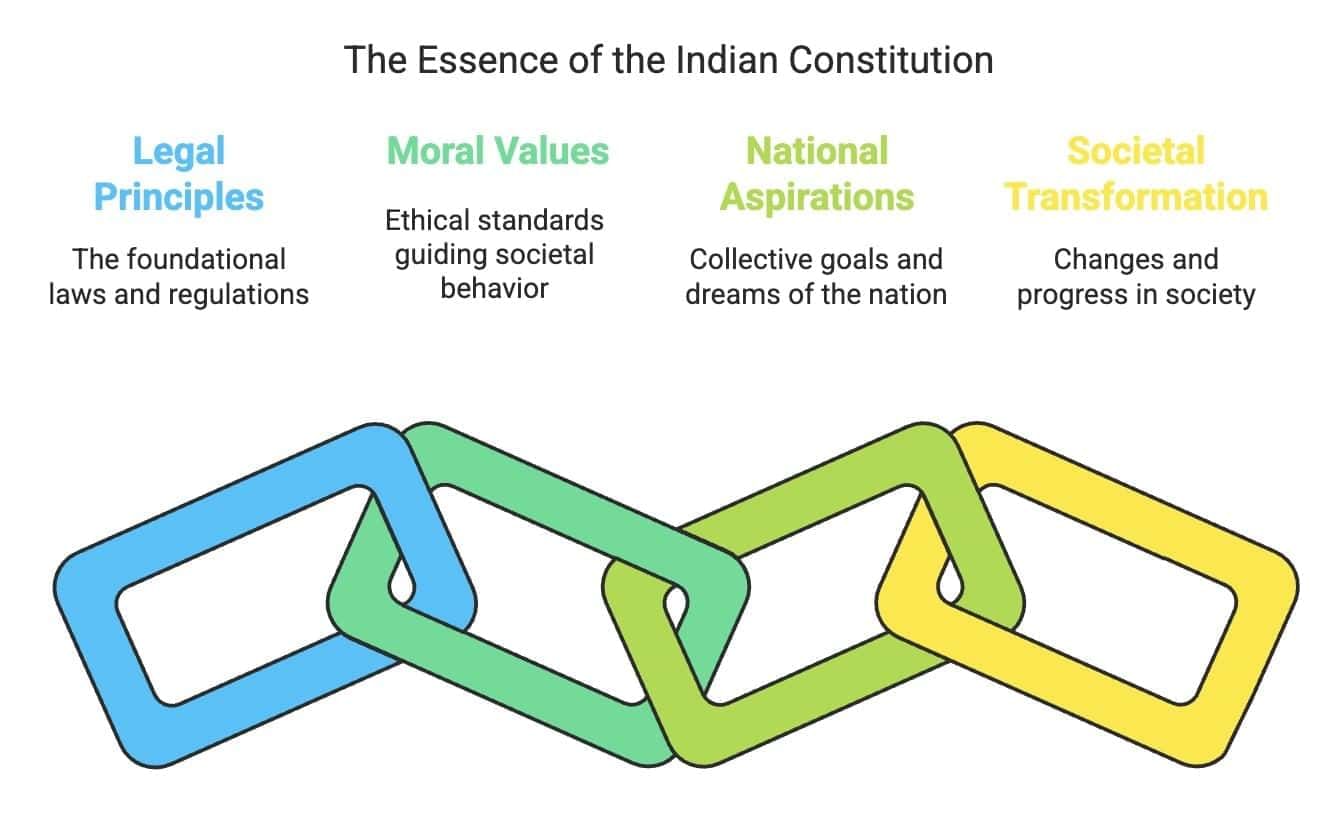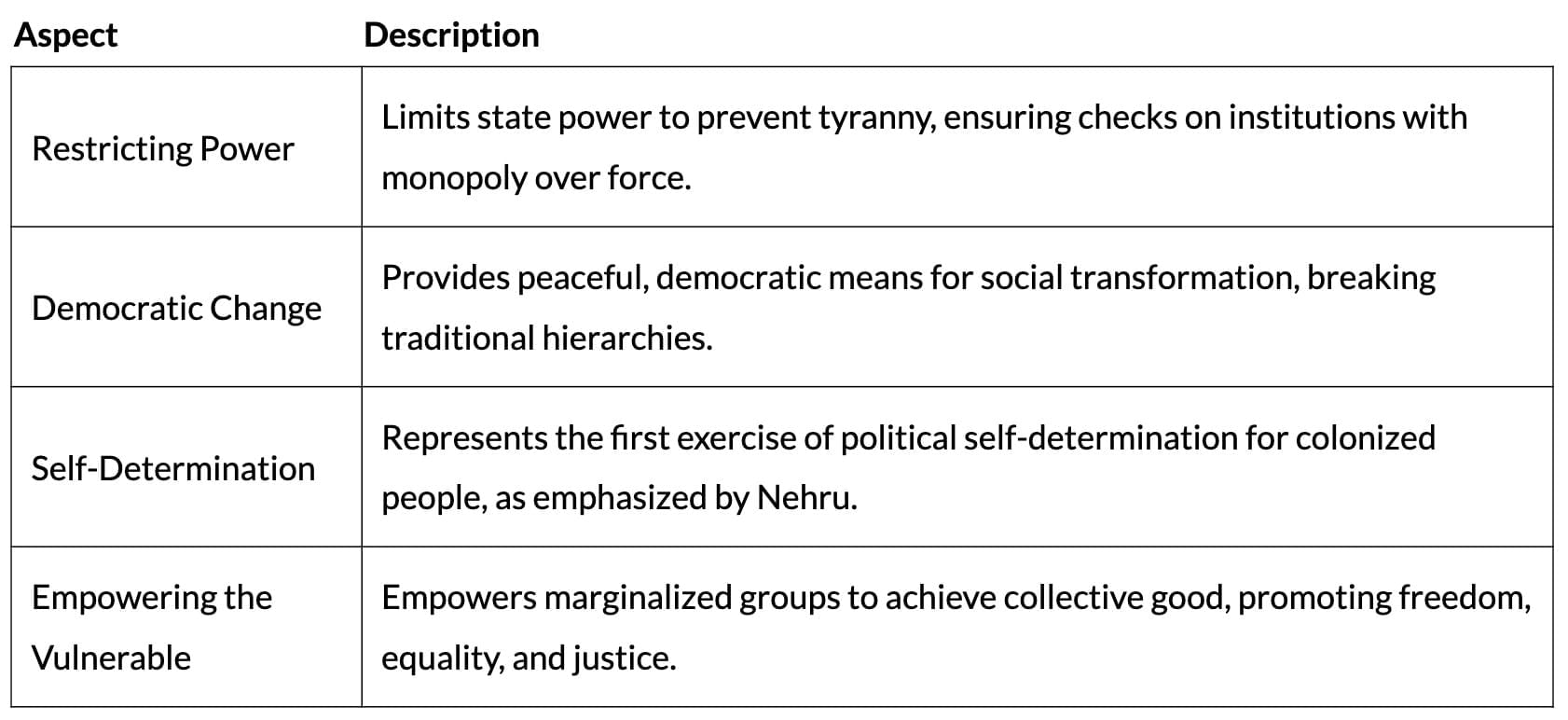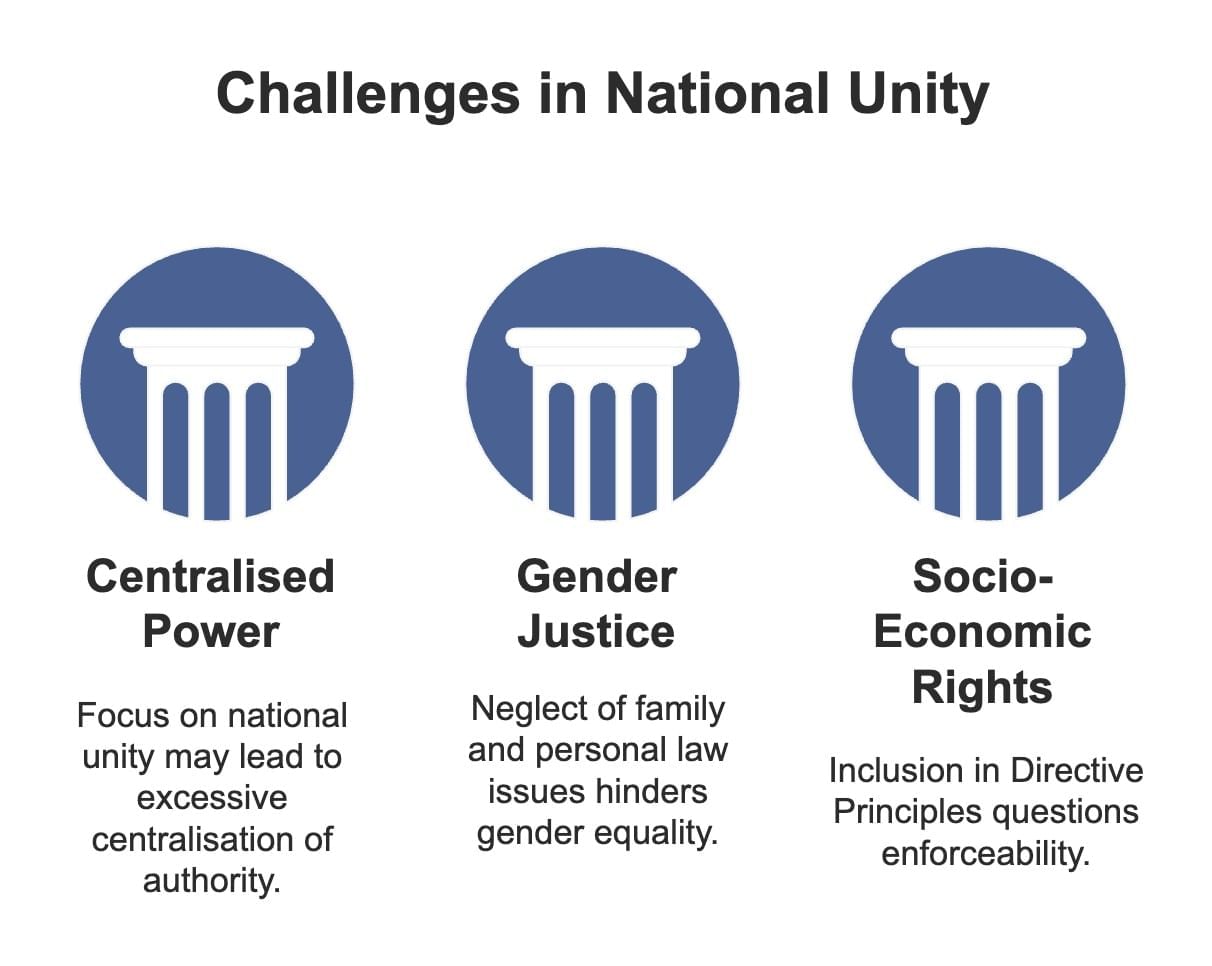Revision Notes: The Philosophy of Constitution | Political Science Class 11 - Humanities/Arts PDF Download
The Indian Constitution is more than a legal document; it embodies values and ideals shaping India’s democratic journey. It merges legal principles with moral values, reflecting national aspirations and guiding societal transformation.

What is the Philosophy of the Constitution?
The philosophy of the Constitution integrates laws with moral values, requiring a political philosophy approach to understand its conceptual structure, societal vision, and historical context.
- Conceptual Structure: Examines meanings of terms like ‘rights’, ‘citizenship’, ‘minority’, and ‘democracy’ used in the Constitution.
- Societal Vision: Develops a coherent vision of society based on these concepts, reflecting embedded ideals.
- Historical Context: Analyses Constituent Assembly Debates to understand the framers’ justifications for chosen values.
This approach identifies the Constitution’s moral content, evaluates its claims, and arbitrates between differing interpretations of values in political arenas like legislatures and media.
Constitution as a Means of Democratic Transformation

Nehru viewed the Constituent Assembly as a nation transitioning from old structures, with elected representatives framing the Constitution without external interference.
Why Revisit the Constituent Assembly?
- Understands farmers’ intentions and concerns, providing insight into the Constitution’s normative role today.
- Values and ideals remain relevant, as India’s societal context has not drastically changed.
- Helps grasp current constitutional practices and their philosophical underpinnings through historical debates, including colonial-era discussions.
Political Philosophy of the Indian Constitution
The Constitution’s philosophy is multifaceted, encompassing liberal, democratic, egalitarian, secular, and federal principles, sensitive to minorities and disadvantaged groups, while fostering national unity.
Individual Freedom
- Rooted in over a century of advocacy (e.g., Rammohan Roy’s push for press freedom).
- Ensures freedom of expression and protection from arbitrary arrest, reflecting liberal ideology.
- The Indian National Congress emphasised individual rights for over 40 years before the Constitution.
Social Justice
- Goes beyond classical liberalism by linking individual rights to social justice.
- Provides reservations for Scheduled Castes and Tribes to address historical injustices, beyond mere equality rights.
Respect for Diversity and Minority Rights
- Promotes equal respect among communities despite caste hierarchies and religious rivalries.
- Recognises community-based rights (e.g., religious communities’ rights to run educational institutions, potentially government-funded).
- Adopts a unique secularism model with principled distance, allowing state intervention in religion to promote equality and dignity (e.g., abolishing untouchability).
Core Achievements

Universal Franchise
- Significant given India’s traditional hierarchies and recent Western voting rights expansions.
- Reflects nationalism’s focus on every individual’s will, as seen in the Constitution of India Bill (1895) and Motilal Nehru Report (1928).
- Grants every citizen the right to participate in governance, regardless of gender, caste, or status.
Federalism
- Adopts asymmetric federalism (e.g., Article 371A for Nagaland) to address diverse sub-unit needs.
- Recognises linguistic groups as equal, balancing unity with cultural diversity.
- Allows special provisions for certain states, promoting inclusive federal design.
National Identity
- Reinforces a common national identity while preserving regional, religious, and linguistic identities.
- Rejects separate religious electorates to foster fraternity and unity, as envisioned by Ambedkar and Patel.
- Aims for a cohesive ‘one community’ without forced assimilation.
Procedural Achievements
- Reflects faith in political deliberation, emphasising inclusiveness and flexibility despite underrepresentation in the Constituent Assembly.
- Debates justified outcomes through reason, valuing compromise and accommodation among equals.
- Consensual decisions prioritised over majority votes, balancing multiple values.
Criticism
- Unwieldy Size: Criticised for being large and detailed compared to compact constitutions like the US’s.
- Unrepresentative: Constituent Assembly lacked universal suffrage, representing mainly advanced societal sections, though debates covered diverse issues.
- Alien Nature: Seen as borrowed from Western models, but adapted innovatively to fit India’s context, blending modern and traditional values.
- Hybrid Culture: Emerged from combining Western modernity with local traditions, as seen in Dalit use of legal systems since 1841.
Limitations
- Centralised Power: Strong focus on national unity may centralise authority, affecting the centre-state balance.
- Gender Justice: Glosses over family and personal law issues, limiting gender justice.
- Socio-Economic Rights: Included in Directive Principles rather than Fundamental Rights, questioning enforceability.

Conclusion
The Indian Constitution blends modern and traditional values to promote democracy, justice, and unity. Despite criticisms of its size, representativeness, and perceived Western influence, its philosophy drives democratic transformation. Revisiting the Constituent Assembly reveals how it balances individual rights, social justice, and national identity, making it a robust framework for India’s diverse society.
|
43 videos|268 docs|39 tests
|
FAQs on Revision Notes: The Philosophy of Constitution - Political Science Class 11 - Humanities/Arts
| 1. What is the significance of the philosophy of the Indian Constitution? |  |
| 2. How does the Constitution function as a means of democratic transformation? |  |
| 3. Why is it important to revisit the Constituent Assembly debates? |  |
| 4. What are the key features of federalism in the Indian Constitution? |  |
| 5. What criticisms and limitations are associated with the Indian Constitution? |  |















